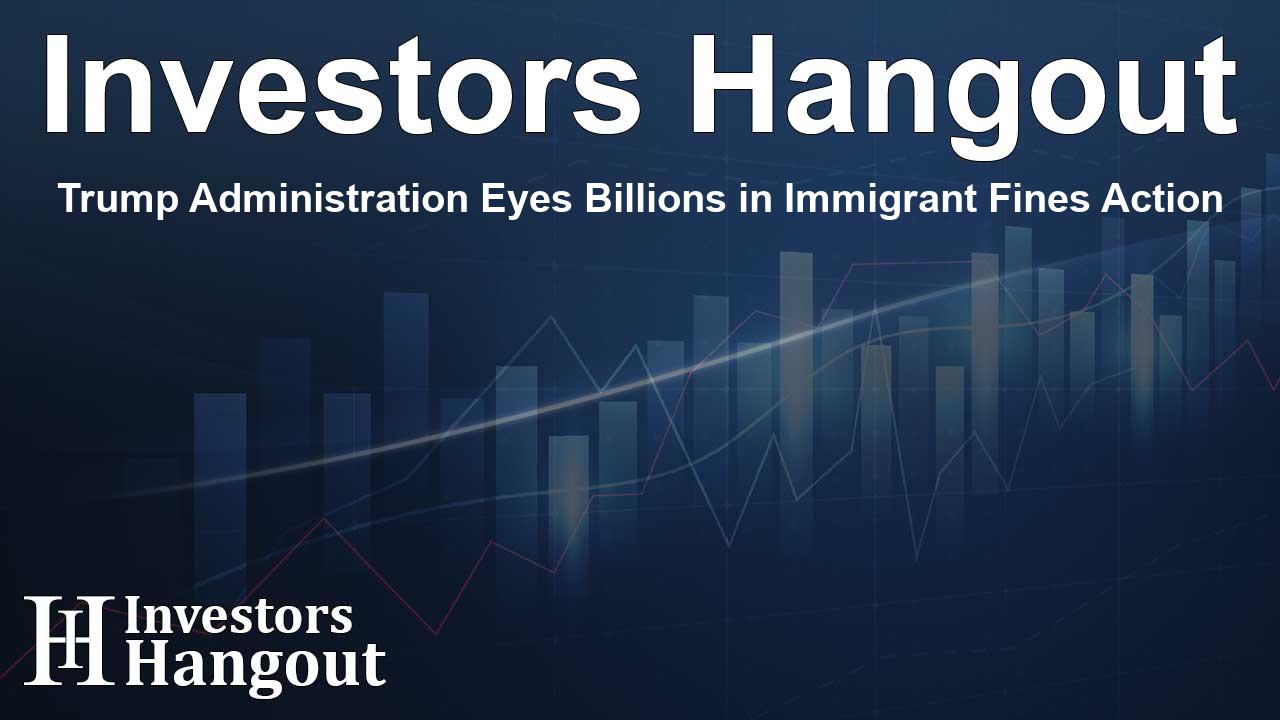Trump Administration Eyes Billions in Immigrant Fines Action

Trump Administration's New Immigration Fine Initiative
The Trump administration has unveiled an ambitious plan to collect a staggering $6.1 billion from immigrants who have allegedly ignored deportation orders. This initiative signals a shift in the enforcement landscape that has caught the attention of many.
DHS Appeals to Immigrants: A Strong Warning
The Department of Homeland Security has put measures in place to recover these significant penalties. Reports indicate that immigrants are being warned about potential lawsuits, debt collections, and hefty tax liabilities if they do not comply with the fines.
Aiming to Reduce Backlogs
This latest move follows a pattern of the current administration, which has actively implemented strict policies to alleviate the backlog within the immigration court system. The fines imposed—totaling 21,500—serve the dual purpose of pressuring individuals to leave the country and streamlining a clogged system.
Understanding the Costs: A Frightening Reality
The day-to-day fines can reach as high as $998, calculated retroactively over five years, resulting in monumental sums—up to $1,820,352 for an individual. Such amounts can be intimidating and challenging for many immigrants.
Voices From the Department of Homeland Security
According to Tricia McLaughlin, a spokesperson for DHS, the focus of these fines targets individuals who do not comply with voluntary departure agreements. This announcement has raised concerns, particularly among low-wage workers who may struggle to meet these financial demands.
Consequences of Non-Payment: A Taxing Situation
Another significant concern is the implication that taxes could apply to these unpaid fines. As detailed by tax experts, there is skepticism surrounding the IRS's potential treatment of these fines as taxable income. Keith Fogg, a respected professor at Harvard Law School, highlights the complexities involved in defending against such financial obligations, especially for those lacking resources.
Challenges Faced by Immigrants
Many individuals faced with these fines report feeling overwhelmed and intimidated, often leading them to consider self-deportation to avoid the financial burden. This tactic reflects the broader fear instilled by the stringent measures enacted following the Trump administration's policies.
The Inflation Factor: Economic Implications of Strict Policies
Recent immigration policies introduced by the Trump administration warrant critical analysis. These measures have been scrutinized for their potential to trigger an inflationary effect on the economy. Though implementation is ongoing, experts suggest that the results could skyrocket inflation rates considerably.
Expert Opinions on Risks
Mark Zandi, a renowned economist, has expressed concerns that the current trajectory could lead to inflation increasing from 2.5% to nearly 4% in the forthcoming months. This projection raises valid questions about the long-term economic impacts of such immigration strategies.
Potential for Increased Strain on Immigrant Communities
The pressures exerted by the administration's policies create a worrying landscape for immigrant communities. New visa restrictions for foreign truck drivers have compounded these issues, further exacerbating labor shortages in key sectors.
A Call for Careful Consideration
As the Trump administration continues to forge ahead with policies that alter the fabric of immigration enforcement, the implications for millions remain profound. A careful examination of these repercussions is necessary for understanding the evolving dynamics within the nation's immigration narrative.
Frequently Asked Questions
What is the source of the $6.1 billion in fines?
The fines stem from immigrants ignoring deportation orders issued by the DHS as part of Trump administration policies.
How does the DHS plan to enforce these fines?
The DHS aims to employ measures including lawsuits and tax implications to recover the fines from individuals.
What are the potential consequences for immigrants?
Immigrants face significant financial burdens if they do not comply with these fines, potentially leading to legal action and tax issues.
How do tax experts view these unpaid fines?
Tax experts find comparing unpaid fines to parking tickets confusing, arguing that such fines should not be treated as taxable income.
What are the larger economic implications of these policies?
Critics warn that strict immigration policies may contribute to rising inflation rates and create additional challenges for various economic sectors.
About The Author
Contact Caleb Price privately here. Or send an email with ATTN: Caleb Price as the subject to contact@investorshangout.com.
About Investors Hangout
Investors Hangout is a leading online stock forum for financial discussion and learning, offering a wide range of free tools and resources. It draws in traders of all levels, who exchange market knowledge, investigate trading tactics, and keep an eye on industry developments in real time. Featuring financial articles, stock message boards, quotes, charts, company profiles, and live news updates. Through cooperative learning and a wealth of informational resources, it helps users from novices creating their first portfolios to experts honing their techniques. Join Investors Hangout today: https://investorshangout.com/
The content of this article is based on factual, publicly available information and does not represent legal, financial, or investment advice. Investors Hangout does not offer financial advice, and the author is not a licensed financial advisor. Consult a qualified advisor before making any financial or investment decisions based on this article. This article should not be considered advice to purchase, sell, or hold any securities or other investments. If any of the material provided here is inaccurate, please contact us for corrections.
